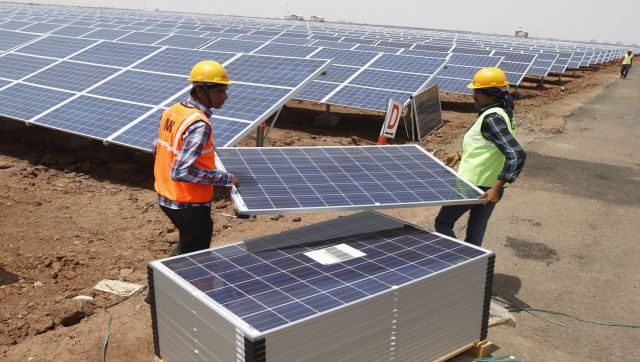For India to become energy-reliant as well as go green, solar power is very important. Reuters
Given the impeding elections, the 2024 budget will be an interim budget or a vote of account that will give the current government, the authority to spend capped sums of money till a newly elected government takes over the office after the April-May 2024 general elections. The full-fledged budget is expected to be rolled out in July 2024. Since typically in these situations, incumbent governments are focussed on measures which are popular with the voting populace, the industry, in general, does not expect big bang sectoral reforms to be the area of focus.
However, it must also be kept in mind that the energy sector has been the critical focus of the present government. For the last few years, the focus of the Central government and indeed the world, has been on ‘greener growth.’ This is driven not only by policy decisions but the inevitable (and evident) impact of climate change.
The government’s commitment to increase renewable generation capacity to 500 GW by 2030 resulted in the sector receiving a whooping 58 per cent increase in allocation of Rs20,671 crore in last year’s budget. It is believed that continued support will be extended to the sector in this year’s budget as well. The support towards the sector and a push towards continued reforms indicate that the government may lay the groundwork for critical reforms and announcements (through the full-fledged budget) once the elections are concluded.
Related Articles

Vantage | What India must do to be a $7 trillion economy by 2030

Union Budget and expectations for a design-driven economy
Industry stakeholders have identified and flagged issues like cross-subsidy charges (CSS), high transmission, wheeling charges and complex approval processes, perennial issue of poor fiscal health of DISCOMs, as roadblocks to the continued growth of the renewable sector. While the Ministry of Power has curbed CSS charges escalation other measure like simplification of intra-state open access through a streamlined approval process (ideally a single-window clearance) etc. a very important, yet relatively simple reform that can be undertaken to achieving net zero by 2030 (which is India’s international commitment) is increasing renewable generation and deep decarbonization across the power generator and consumption chain.
The key to achieving net zero by 2030 (which is India’s international commitment) is increasing renewable generation and deep decarbonization across the power generator and consumption chain.
Another pressing concern is India’s dependence on solar panel imports, (~$1.13 billion in the first half of the current financial year). Therefore, budgetary measures and allotment to promote indigenous development, facilitate technology transfer, and incentivise localised manufacturing initiatives to conserve foreign exchange would be welcomed, though the short-term reliance on imported panels is likely to continue.
The other key initiative which we expect the budget to address is the whole transition to green fuels and more sustainable energy fuels. A considerable push by the government has been seen in green hydrogen.
Measures with a focus on the price point for production of green hydrogen (by reducing the cost of electrolysers and other allied input costs like renewable energy and pumped storage supply costs) to reach the stated goals of achieving a price of $1 from the prevailing market rates would be welcome. Emphasis should on both the demand and supply, with investments in green hydrogen infrastructure as well as creation of green hydrogen hubs which will create economies of scale.
Automobile companies should receive continued support and a push towards green mobility which may involve direct subsidisations such as PLIs. Equally, allocation for facilitating green charging infrastructure and energy storage infrastructure would be extremely welcome.
There is definitely a push towards smart grids and smart gas distribution systems. Viability gap funding for these projects would also be welcome.
Deep decarbonization has to operate at multiple levels for increasing energy efficiency across sectors would be imperative. An ally to any policy maker would be technology. The government needs to drive innovation in aspects like energy storage, round the clock power supply and deep decarbonisation. A road map for a carbon market has been expected over the last year’s budget and would not be out of place were it in the interim budget.
Given the sharp increase of tariffs, specifically for individuals, consumers expect to receive subsidisation under the recently launched Pradhanmantri Suryodaya Yojana, a scheme to make electricity affordable by subsidisation. The electricity sector is expected to receive a surge to reduce the burden of high tariffs.
However, it is not untoward to mention that the government officially did not wait for the budget to introduce notable changes to the electricity sector like comprehensive amendments to the Electricity Rules in January 2024. One of key amendments was emphasis and encouragement of captive power plants and other generating utilities aiming to supply power to numerous individual consumers. The plethora of reforms include easing open access requirements, facilitating easier grid connectivity, delivering dedicated transformation capacity charges and subsidising open access charges etc. This shows that the Government is guiding the growth of sectoral power market with a clear focus on commercially oriented PPAs.
On a concluding note and as mentioned above, with the imminent budget only being an interim budget it is unlikely that the government will push through any critical reforms. However, the industry would keenly be watching the budget for tell-tale signs which would indicate the government’s intent to push through critical reforms in the not-too-distant future and potentially through the detailed budget due later this year.
Deepto Roy is Partner, Rohit Rajagopal is Principal Associate and Disha Adhikary is Senior Associate at Shardul Amarchand Mangaldas & Co. Views expressed in the above piece are personal and solely that of the author. They do not necessarily reflect Firstpost’s views.
Read all the Latest News, Trending News, Cricket News, Bollywood News,
India News and Entertainment News here. Follow us on Facebook, Twitter and Instagram.





